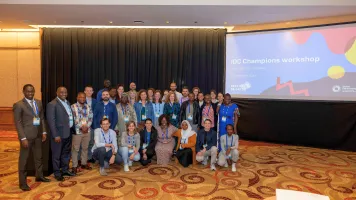This piece is part of a Global Disability Summit blog series from Inclusive Data Charter Champions.
The upcoming Global Disability Summit represents another important milestone in global efforts to create more inclusive societies. New, ambitious, and widespread commitments from the Summit will be critical to ensuring equitable access and participation of persons with disabilities in all aspects of society.
The commitment to leaving no one behind demands that children and adults with disabilities are accurately reflected in national statistics, that data are of high quality and account for all individuals. Fulfilling this obligation calls for deliberate and strategic action to make data collection and monitoring efforts disability-inclusive.
Towards disability-inclusive data
Most countries have estimates of the proportion of persons with disabilities. Yet the quality, relevance and usability of such data are often questionable due to outdated methodologies and the approaches used for measurement. Generating internationally comparable data that reflect the experience of everyone requires carefully thought out strategies for inclusion.
Inclusivity affects all stages of the data generation process. It involves important considerations throughout – from the design of tools and methods for gathering the data to the dissemination of results. The production of inclusive data also demands the involvement of persons with disabilities to ensure that their experiences and needs are adequately reflected in the evidence being generated. This involves:
- Collecting data that address the critical issues facing children and adults with disabilities, such as the availability and accessibility of services
- Developing and implementing accommodation strategies, such as the provision of sign language interpretation, to ensure that persons with disabilities can participate in surveys, censuses and programme evaluation data collection
- Designing dissemination of the results and advocacy strategies to promote data use and action with key stakeholders.
The drive for better data on children with disabilities.
Following the release of the UNICEF/Washington Group Child Functioning Module, the last five years have seen a substantial rise in the availability of data on children with disabilities. The recent UNICEF publication, Seen, Counted, Included: Using data to shed light on the well-being of children with disabilities, is a testament to these efforts. Drawing on internationally comparable data from 43 countries and areas, the publication covers more than 60 indicators of child well-being – from nutrition and health, to education, to access to water and sanitation – including several indicators used to report on the Sustainable Development Goals.
Building on this momentum, UNICEF launched the Centre of Excellence on Data for Children with Disabilities in the fall of 2021. The mission of the Centre is to enhance the ability of stakeholders to make timely and data-driven decisions that can improve the lives of children with disabilities.
Working together to fill the gaps
An immediate objective of the Centre is to meet the growing need for coordination, quality oversight and technical expertise in the field of disability data. It will do this by supporting a broad range of activities to improve the skills of data producers and users, spur new methodologies and tools, and support data collection, analysis, interpretation and use, with the goal of generating new knowledge. The Centre will also lend support to the application of data to policymaking and programming.
The goal of inclusivity will remain paramount throughout, with the Centre working to support the development of methodologies aimed at minimizing bias and underreporting that may affect enumeration efforts. It will also disseminate best practices to encourage the inclusion of persons with disabilities in data collection and data-driven policymaking. Innovation and partnership are core principles. The Centre’s work is guided by a Strategic Advisory Group consisting of members from diverse backgrounds with the expertise and insights for practical and strategic collaboration.
Using data as a springboard for action
As called for in the Global Disability Summit, governments and organizations should commit resources to overcome all barriers that prevent persons with disabilities from participating in and benefiting from global progress. Poor-quality data can undermine efforts towards global commitments. Counting all children requires the building of capacity so that quality standards are adopted worldwide for official disability statistics. Countries need support in their efforts to collect, analyze and disseminate disability data. This should include the engagement – and empowerment – of all relevant stakeholders.


